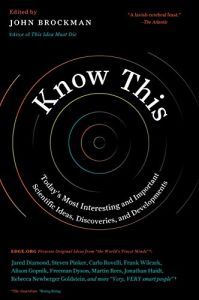Join getAbstract to access the summary!

Join getAbstract to access the summary!
John Brockman
Know This
Today’s Most Interesting and Important Scientific Ideas, Discoveries, and Developments
Harper Perennial, 2017
What's inside?
Explore this compendium of nuggets about new scientific breakthroughs to see how knowledge changes.
Recommendation
When you ask a range of prominent thinkers to identify the most important scientific news of the day, and then you pull their answers together in a wide-ranging collection, it’s amazing what you get. John Brockman has edited and produced an overwhelming collection of essays to dip into, but probably not read front to back. He offers 600-plus pages of commentary by 198 writers he describes as “very, very smart people” on current advances in all fields of science. The collection moves from papal encyclicals to drones, to the nature of consumption, the physical universe and developments in battery technology. Scientists agree that climate change is real, dangerous and important and that physics is in a state of flux. The brief essays come from many disparate fields; the newness – and coolness – of the innovations the writers cover is the theme that unifies the book. Brockman’s encyclopedia will absorb anyone interested in science, discovery, change or the joy of astonishment.
Summary
About the Author
Editor John Brockman publishes the online science salon Edge.org and has edited several bestsellers, including This Idea Must Die and This Explains Everything.


















Comment on this summary